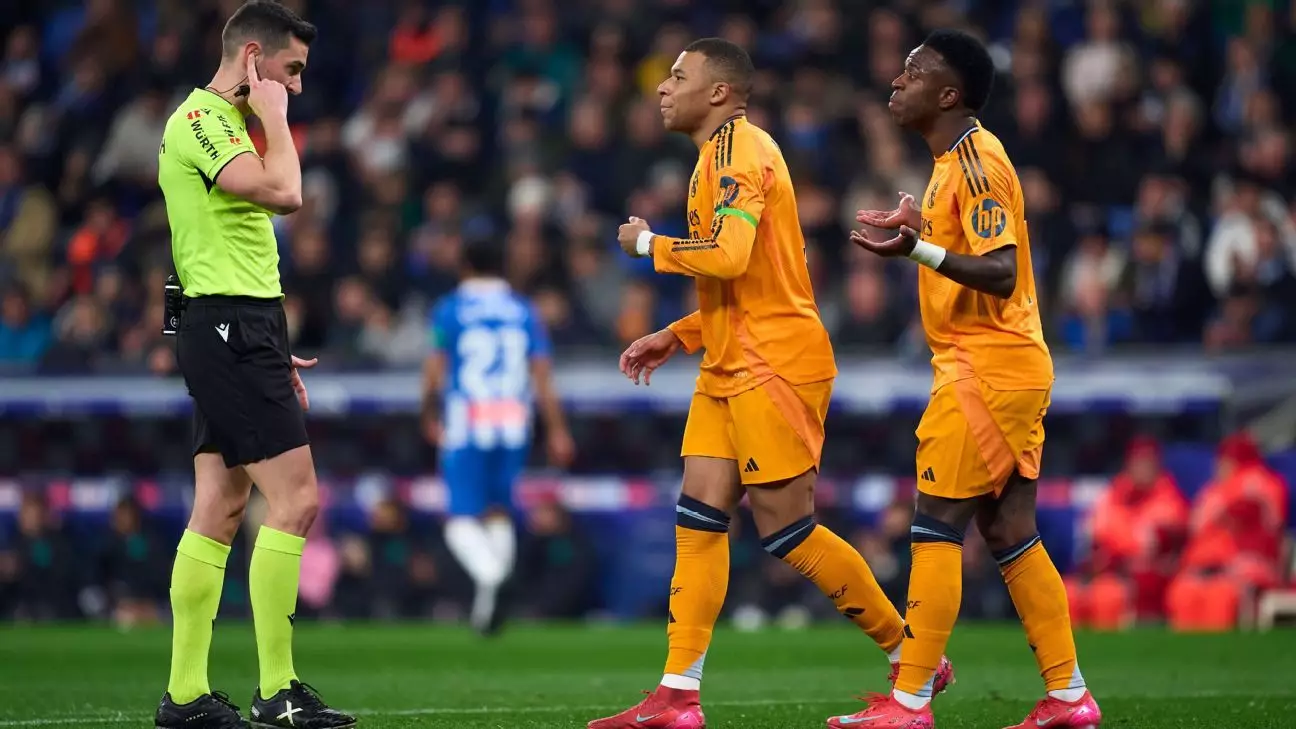The world of football is passionate and charged with emotions, but nothing can stir the pot quite like controversies surrounding refereeing decisions. Real Madrid, one of the most storied football clubs globally, finds itself embroiled in a significant dispute regarding match officiating. This situation emerged prominently after a recent LaLiga defeat against Espanyol, wherein the club’s executives sought answers from the Spanish refereeing authority, elevating the issue to a matter of institutional credibility and transparency within Spanish football.
Real Madrid’s frustration ignited after their 1-0 loss to Espanyol. The decisive moment of the match was a contentious refereeing decision involving Espanyol defender Carlos Romero. The clash with Kylian Mbappé, which many believed warranted a red card, was overlooked by referee Alejandro Muñiz Ruiz. This oversight took on a life of its own when Romero later went on to score the match’s only goal, leaving Madrid fuming with disbelief over the officiating standards being displayed.
In reaction to this perceived injustice, Real Madrid took decisive steps by filing a formal complaint with the Spanish Football Federation (RFEF), requesting greater accountability. Their demands included access to the audio from the Video Assistant Referee (VAR) discussions surrounding Romero’s challenge. The club’s open letter asserted that the integrity of the competition was at stake, alleging systemic “manipulation and adulteration” due to the refereeing process being “completely discredited.” Such strong words resonated across the football community, inviting backlash not just from the RFEF but also from LaLiga and other rival clubs.
In a bid to address their grievances, top officials from Real Madrid convened with Luis Medina Cantalejo, the head of Spain’s technical committee of referees (CTA), at RFEF’s headquarters. Attending were club director José Ángel Sánchez and board secretary José Luis del Valle. The tone of the meeting, according to Medina Cantalejo, was important to underscore: discussion took place in a “friendly” and transparent atmosphere, a stark contrast to the potential for conflict the situation could have bred.
The CTA’s head acknowledged that discussing contentious incidents is part of maintaining healthy dialogues between clubs and referees. The length of the meeting indicated a profound desire to foster understanding, as issues in football often merit exhaustive discussions. While Real Madrid aimed to secure clarity over the referee’s critical decisions, the RFEF maintained that their protocols had followed due process, emphasizing fair treatment for all clubs involved.
Continued Discontent and Broader Implications
Despite engaging with the refereeing body, Real Madrid left the meeting with lingering uncertainties regarding the non-red card decision on Romero. Reports suggest that the club sought reforms aimed at enhancing the refereeing standards and accountability, but felt exposed in light of subsequent controversial referee decisions in their following matches. This consistent trend of refereeing anomalies has left the Madrid camp questioning if their complaints truly resonate within the walls of decision-making bodies.
Head coach Carlo Ancelotti has been vocal, hinting at a tangible problem with refereeing consistency, especially following recent matches where critical calls went against his team. Ancelotti’s comments reflect a collective sentiment at the club, echoing wider frustrations across their fanbase and creating a ripple effect in the media narrative surrounding officiating in Spanish football.
The growing dissatisfaction among clubs like Real Madrid over officiating standards necessitates a thorough examination of the refereeing framework in place in Spain. The reliance on VAR was introduced to curtail human error, yet the ability of its implementation to resonate and instill confidence remains a contentious topic. Madrid’s calls for improved transparency suggest that fans and clubs alike seek not just accountability, but also a guarantee that the spirit of fair play prevails in matches that shape the dynamics of the league.
As football continues to evolve, the debates surrounding refereeing will remain pivotal to the sport’s integrity. For Real Madrid, the path ahead involves seeking clarity not only for themselves but also for a fanbase hungry for justice and respect for the game’s authentic ethos. Ultimately, this saga embodies larger questions about oversight, transparency, and the essence of competition in contemporary football.

